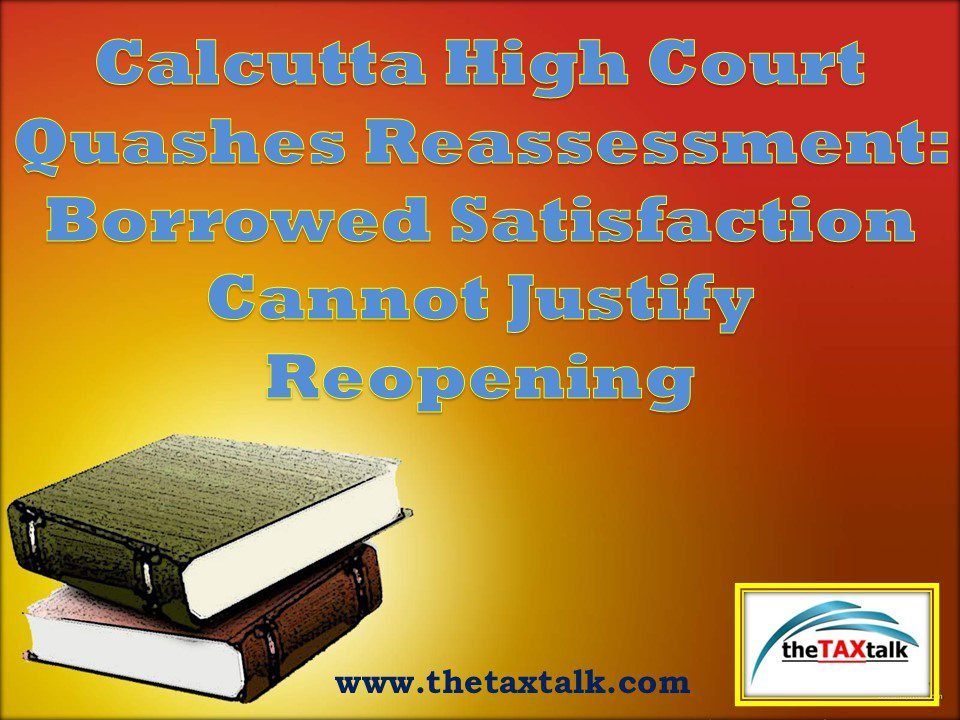![]()
Calcutta High Court Quashes Reassessment: Borrowed Satisfaction Cannot Justify Reopening
Case: PCIT-1, Kolkata vs. Krishna Nirman Pvt. Ltd.
Citation: ITAT/126/2025, Order dated 31st July 2025
Court: Calcutta High Court (Chief Justice T.S. Sivagnanam and Justice Chaitali Chatterjee Das)
Introduction
Reassessment proceedings under Section 147 of the Income Tax Act, 1961 are meant to plug tax leakages where income has escaped assessment. However, courts have consistently emphasized that such power cannot be exercised mechanically. The recent judgment of the Calcutta High Court in PCIT-1, Kolkata vs. Krishna Nirman Pvt. Ltd. reaffirms this principle by quashing a reassessment that was based solely on “borrowed satisfaction” from the Investigation Wing, without independent application of mind by the Assessing Officer (AO).
Background of the Case
The assessment year involved was 2008–09. The Assessing Officer reopened the assessment under Section 147 on the basis of information from the Investigation Wing alleging that the assessee had received accommodation entries in the form of share application and share premium aggregating to ₹93.50 lakh.
• AO’s action: Issued notice u/s 148 and proceeded to add the said sum u/s 68, treating the investment as unexplained cash credit.
• CIT(A): Confirmed the addition, rejecting the assessee’s argument that reopening was bad in law.
• ITAT: Allowed the assessee’s appeal, holding that the reasons recorded by the AO were vague, non-specific, and merely reproduced Investigation Wing inputs without independent satisfaction.
Aggrieved, the Revenue approached the Calcutta High Court under Section 260A, raising two substantial questions of law:
1. Whether the Tribunal erred in quashing reopening on the ground of borrowed satisfaction?
2. Whether deletion of the addition u/s 68 was justified despite the assessee failing to prove creditworthiness and genuineness?
High Court’s Findings
The High Court upheld the ITAT’s reasoning and dismissed the Revenue’s appeal. The key observations are:
1. Borrowed Satisfaction is Invalid
• The AO relied entirely on Investigation Wing reports without forming his own belief that income had escaped assessment.
• Such mechanical reproduction of third-party information does not satisfy the “reason to believe” requirement under Section 147.
2. Vague and Non-Specific Reasons
• The reasons recorded lacked particulars such as the nature of evidence against the assessee or independent verification.
• This made the reopening jurisdictionally defective.
3. Precedents Relied Upon
• PCIT vs. G & G Pharma (Delhi HC)
• PCIT vs. Shodiman Investments Pvt. Ltd. (Bombay HC, 2018)
Both decisions stress that AOs must independently apply their mind; otherwise, the reassessment is bad in law.
4. No Substantial Question of Law
• Since the ITAT’s findings were based on appreciation of facts and settled law, the High Court held that no substantial question of law arose under Section 260A.
Legal Significance
This ruling adds to the growing jurisprudence that:
• Reopening is not a formality. AO must record clear, specific, and independent reasons.
• Investigation Wing inputs are only a starting point. They cannot substitute AO’s satisfaction.
• Borrowed satisfaction = invalid jurisdiction. Any assessment based on it is liable to be quashed.
• Burden on assessee vs. AO’s duty. While the assessee has to prove creditworthiness and genuineness under Section 68, that question arises only if the AO assumes valid jurisdiction. If the very reopening is void, the additions cannot survive.
Practical Takeaways
1. For Taxpayers:
• If reassessment notices are received based solely on Investigation Wing reports or general allegations, challenge the reopening at the earliest stage.
• Always seek a copy of recorded reasons and scrutinize whether they reflect AO’s independent application of mind.
2. For the Department:
• Mechanical reproduction of Investigation Wing material will not stand judicial scrutiny.
• AOs must conduct preliminary inquiry, verify facts, and demonstrate application of mind in the recorded reasons.
3. For Professionals:
• This case is another precedent to cite in defending reassessment challenges where the AO has relied on third-party reports without due diligence.
Conclusion
The Calcutta High Court’s dismissal of the Revenue’s appeal in Krishna Nirman Pvt. Ltd. reinforces the fundamental principle that reassessment power cannot be exercised on borrowed satisfaction. “Reason to believe” must be AO’s own belief, not a borrowed conclusion. By quashing the reassessment, the Court has once again highlighted that procedural safeguards under Section 147 are not empty formalities but jurisdictional mandates that protect taxpayers from arbitrary reopening.
The copy of the order is as under:

